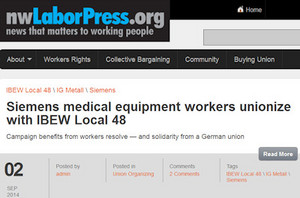https://www.dialog-igmetall.de/nachrichten/success-of-the-international-framework-agreement
27.07.2024, 12:07 Uhr
Success of the International Framework Agreement
- 09.09.2014
- International
Two years ago, IG Metall, General Works Council and IndustriAll signed an International Framework Agreement (IFA) with Siemens. It defines worldwide guidelines for the relations between national management and employees representation. First cases prove that the IFA works - for example in the USA.
Siemens' employes looking for representation
Twenty skilled medical equipment engineers in the Pacific Northwest won union representation Aug. 28 - after a union campaign that got help from as far away as Boston, New York, and Germany. The campaign began when International Brotherhood of Electrical Workers (<link http: www.ibew.org _blank external-link-new-window>IBEW) Local 48 got a phone call in May from a “customer service engineer” at Siemens Medical Services USA. That’s the division of the massive German electronics conglomerate Siemens that maintains and repairs company-made medical imaging equipment like MRIs and cat scans.
Local 48 organizer Ray Lister says the worker had done his homework before the call. He knew everybody’s name in his work group, knew what it would take to win a union, and knew which union to call: IBEW represents workers in the same occupation in Boston and New York. In this case, the work group consisted of 20 customer service engineers spread out over Oregon, Washington, Idaho and Montana. They work out of their homes servicing contracts with health care providers, and they meet infrequently.
Fed up with unilateral decisions
Lister said nearly all the workers have been there more than a decade; they are fiercely loyal to the company, care a lot about their customers, and all make decent money. But they were also sick of several things, Lister said: overwork, arbitrary pay and promotions, occasional disrespect from management, and no say over changes - like the company’s decision to freeze their defined benefit retirement plan.
Anti-union maneuvers ...
IBEW assigned international staff to meet with workers in the four states, and set up conference calls with their IBEW-represented co-workers at Local 2222 in Boston and Local 3 in New York. A majority of workers signed union authorization cards, and on July 8 they petitioned the National Labor Relations Board to schedule a union election. But the company immediately filed a challenge to the proposed bargaining unit definition - a standard anti-union maneuver designed to delay the election. “In a union election campaign, time is an employer’s best friend,” Lister said. “It gives them more opportunities for captive audience meetings, and more time to spread fear.”
... countered with a German ally
But IBEW had an ally in IG Metall, the massive German industrial union. Under German law, workers have a seat at the table in large companies, and exercise sway with company works councils. Siemens had signed an international framework saying it would respect workers rights to unionize, and wouldn’t attempt to bust union efforts. A union representative on the negotiation committee of the Siemens Central Works Council complained that the company’s legal maneuver against Local 48 violated that framework. A day later, the company withdrew its objections, and the election was scheduled for Aug. 27-28.
Mandate for the IBEW
The result: 13 to 6 in favor of joining IBEW Local 48. “These guys were committed to their job, and to each other,” Lister said. A few people were persuaded by management appeals during conference calls.
“I call it the, ‘baby, please don’t go’ defense,” Lister said. “The company says, “Give us another chance. Siemens will get better.” Lister thinks other workers were swayed by fear tactics, or were just uncomfortable with change.
Nonetheless, 13-6 is more than two to one. It’s a mandate, and the company is legally required to bargain in good faith toward a collective bargaining agreement setting out terms and conditions of work. Lister said the Siemens workers in this case hope to get more predictable pay, greater clarity on the steps to promotion, and a commitment by the company to hire more workers to address complaints of overwork and difficulty taking time off.


